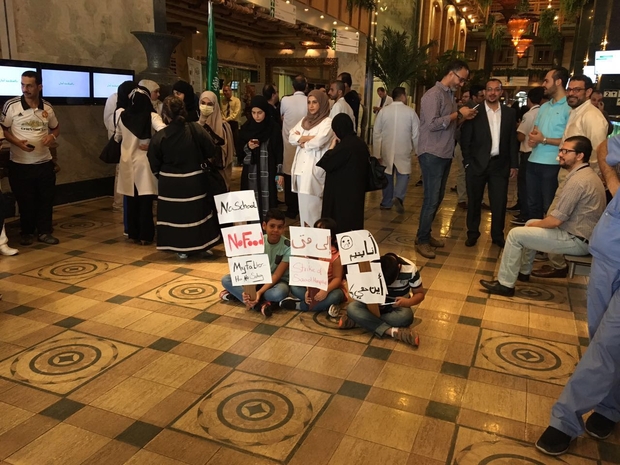In September, hundreds of Saudi and foreign workers employed at a private hospital in Saudi Arabia’s Eastern Province went on strike in protest over months of unpaid wages. The strike, coordinated and orchestrated by both Saudi citizen-workers and migrants, marks a turning point in migrant and labor relations in the Gulf, and indicates the escalation of dire circumstances faced by workers in the kingdom as a result of the economic slump.
According to media reports, an estimated 1,200 hospital staff comprised of surgeons, management, doctors, nurses, and administrative employees at the Saad Specialist Hospital in the city of Khobar had not been paid for at least four months at the time the strike commenced. To contest their absent salaries, both Saudi and foreign workers from the United States, England and countries in South Asia united to take action against their unscrupulous employer. The groups coordinated the joint action via What’sApp, Facebook and Twitter, and submitted a petition signed by eight hundred staff members to King Salman requesting government intervention. Children of hospital staff also took part in the protest, staging a sit-in in the hospital’s lobby with signs that said they were unable to eat or go to school because their parents were not receiving their wages.
Saudi Arabia has been hit hard due to the global drop in the price of oil, and the repercussions for workers in the kingdom are damaging. In the past, migrant workers suffered almost exclusively from economic downturns while Saudi nationals were protected. High profile construction companies in the kingdom, like the Bin Laden Group and Saudi Oger, have failed to pay tens of thousands of migrant workers for periods of up to two years. Earlier this year, the Bin Laden Group laid off 50,000 employees, the majority of whom hail from South Asia and work as construction laborers. At least 7,000 foreign workers employed by Saudi Oger were stranded in July after the firm terminated them and failed to pay their wages. Saudi Oger subsequently stopped providing food, electricity, maintenance and medical services in several of its labor camps in Saudi Arabia, which led the Indian government to intervene and dispatch food and supplies to stranded Indian workers in the Gulf countries.
Migrant workers are disproportionately affected by the economic crisis in the six Gulf Cooperation Council (GCC) countries largely due to a controversial sponsorship system. Under the kafala system, which ties foreign workers to their sponsors, a migrant worker cannot change and/or leave jobs without employer permission, and in Saudi Arabia and Qatar, cannot leave the country without employer permission. Dependent upon their sponsors and faced with little recourse to air grievances, migrant workers are often cheated and denied pay, among other forms of maltreatment.
While non-payment of wages is commonly practiced in lower-waged sectors, where migrant workers are usually employed, the strike that commenced at the hospital is the first time that such abuse has affected other sectors of the kindgom’s workforce, and more importantly, Saudi nationals. The strike is also significant in light of government regulations that circumscribe fundamental labor rights. Despite Saudi Arabia’s ratification of six of the eight core labor standards promulgated by the International Labor Organization (ILO), the country’s national legislation fails to align with these standards. The labor law does not allow workers the right to join or form unions, and prescribes penalties for those who attempt to organize. Further, the law does not provide for collective bargaining or the right to strike.
As the crisis continues, migrant workers will continue to be disproportionately affected. Yet the strike at Saad Hospital, which defies the citizen-non-citizen trope in the kingdom in which Saudi citizens reap the benefits of oil compared to their blue-collar counterparts, is one of the first collective actions of its kind to emerge in the Gulf region. The joint strike elucidates even further the impact of the global economic crisis on all workers in the country, irrespective of nationality.





